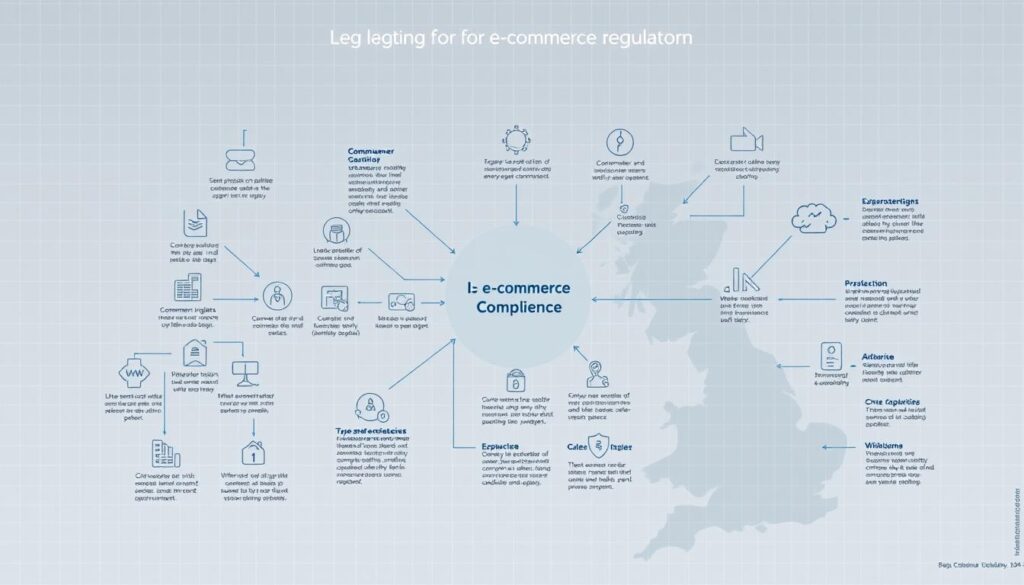The UK is now Europe’s top e-commerce market, valued at £236 billion last year. As the market changes, businesses must keep up. They need to meet new consumer needs and find fresh ways to stay ahead.
This study will look at what makes a UK e-commerce business successful. It will use lessons from top e-commerce stories. You’ll learn how to succeed in this fast-changing field. Also, check out this link for more on new business ideas like subscription boxes.
Table of Contents
Key Takeaways
- The UK e-commerce market is projected to continue substantial growth.
- Understanding consumer behaviour is vital for market adaptation.
- Mobile commerce plays a critical role in boosting e-commerce sales.
- Improving user experience can greatly improve online shopping.
- Strong marketing is key for keeping customers interested and loyal.
Understanding the Current E-Commerce Landscape in the UK
The e-commerce market in the UK is changing fast. It’s influenced by big trends and more people shopping online. By looking at how people shop online, businesses can make their products better fit what customers want.
Studying online shopping examples shows how key these points are. They help businesses create good plans.
Statistics and Trends Shaping the Market
New figures show a big growth rate of 8.4%. This means more people are shopping online. The market is expected to hit £243 billion by 2027.
Mobile shopping is becoming more popular. People like buying things on their phones. This is because more people, like millennials and Gen Z, use technology a lot.
Consumer Demographics and Shopping Behaviour
Looking at who shops online in the UK, we see many different people. Younger people, like millennials and Gen Z, love shopping on their phones and care about the planet. But older people are starting to shop online too, in areas like clothes and gadgets.
This shows the market is getting bigger. It’s welcoming people of all ages to shop online.
Key Drivers of E-Commerce Growth in the UK
The UK’s retail scene has changed a lot. This is thanks to mobile shopping and how people shop differently. Knowing what drives this change helps you keep up.
The Role of Mobile Commerce
Mobile shopping in the UK is huge, with over 50% of e-commerce traffic coming from phones. In 2022, 67.2% of sales were made on smartphones. This shows how important mobile shopping is.
More than 60% of online shopping happens on mobiles. Websites need to load fast to keep users. Over 40% of users leave if a site takes more than 3 seconds to load.
Brands that focus on mobile can see a 30% increase in sales. Making your site mobile-friendly is key to success in e-commerce.
Impact of the Pandemic on Online Shopping
The pandemic has greatly affected online shopping. In 2020, internet retail sales jumped by 47%. This was because people started shopping online more.
Businesses had to make their online presence stronger. They focused on mobile-friendly websites and apps. This was to meet the changing shopping habits.
Success today means understanding what customers want. It’s important to keep up with trends, even after the pandemic. This helps businesses thrive.
To improve your mobile strategy, check out mobile optimisation tips. They can help your e-commerce site stand out in a competitive market.
Legal Requirements for a Successful E-Commerce Business Case UK
To start a strong e-commerce business in the UK, you need to know the laws well. The E-Commerce Regulations 2002 and the Consumer Rights Act 2015 are key. They protect both shoppers and sellers. Following these laws helps you build trust with your customers.
Understanding UK E-Commerce Regulations
The UK’s e-commerce rules cover important areas like being clear and fair. You must tell customers about prices and how long delivery takes. You also need to make it easy for them to cancel orders, which helps protect their rights.
Key Consumer Rights and Data Protection Laws
Consumer laws in the UK mean shoppers get what they expect. You should have clear rules for buying and returning things. This makes it easy for customers to get refunds if needed. Also, keeping customer data safe is vital. Following GDPR rules helps protect this information and keeps shoppers trusting your site.
Knowing and following these laws helps you avoid big fines. It also makes your business more efficient. Companies that focus on following the rules often see more loyal customers. For more on these laws, check out this detailed resource.
Choosing the Right E-Commerce Platform
Choosing the right e-commerce platform is key to your business’s success. There are many options, each with its own strengths and weaknesses. The platform you pick affects things like user experience, functionality, and how well it can grow with your business.
Platforms like Shopify, BigCommerce, and WooCommerce have features for different business needs. They help you set up your online store and grow your business.
Comparative Analysis of Popular Platforms
| Platform | Starting Price | User Experience Rating | Key Features |
|---|---|---|---|
| Shopify | £29/month | 4.5/5 | Easy setup, extensive app store, mobile optimised |
| BigCommerce | £29/month | 4.3/5 | Robust inventory management, no transaction fees |
| WooCommerce | Free (with hosting costs) | 4.4/5 | Highly customizable, built on WordPress |
Knowing what each platform offers is important. A user-friendly dashboard is key for a good online presence. Shopify is easy to use, while BigCommerce is great for big businesses.
Choosing the right platform for your business can make a big difference. Look for platforms in the UK that fit your business needs well.
Importance of User Experience in E-Commerce Platforms
User experience in e-commerce is very important. A good platform makes it easy for customers to navigate and shop on mobile. This keeps customers interested and can increase sales.
A well-designed site can make your business stand out. It can also help keep customers from leaving without buying. You can find more tips on improving user experience in e-commerce here.
By focusing on user experience, you can build customer loyalty. This is essential for success in the competitive e-commerce world.
Payment Processing Solutions and Their Impact
Understanding payment processing solutions is key for UK shoppers. The variety of payment methods UK consumers use can affect their shopping experience. This variety is important for driving sales.
Traditional credit and debit cards are popular. But, digital wallets and direct bank transfers are gaining ground. This shows the need for flexible payment options in the UK.
Variety of Payment Methods for UK Shoppers
Offering many payment options can attract more customers. Sites that meet different payment needs are more appealing. Here’s a look at the most used payment methods in the UK:
| Payment Method | Percentage of Users |
|---|---|
| Credit/Debit Cards | 60% |
| Digital Wallets (e.g., PayPal, Apple Pay) | 25% |
| Bank Transfers | 10% |
| Buy Now, Pay Later (e.g., Klarna) | 5% |
Transaction Security and Consumer Trust
Keeping transactions secure is essential for e-commerce. Reliable payment gateways like Stripe and PayPal help. Following PCI DSS standards and using encryption builds trust.
Being open about transactions also helps. A secure environment encourages loyalty and repeat business.
Effective Marketing Strategies for E-Commerce Success
To succeed in the UK’s e-commerce world, you need good marketing strategies. A great plan includes improving your SEO, using social media well, and being good at email marketing. Each part is key to getting noticed and keeping customers interested.
Optimising SEO and Digital Presence
Good SEO is key to getting more visitors to your site. Use the right keywords for your products and services. Also, do local SEO to attract people in your area, which can lead to more sales.
Make your site easy to navigate and fill it with useful content. This helps search engines understand your site better. This means you’ll get higher rankings and more people will find you.
Engaging Consumers Through Social Media and Email Marketing
Social media is a great way to get your products seen by more people. Use platforms like Instagram, Facebook, and TikTok to show off your products. This can make people excited to buy from you.
Email marketing is also very effective. Send out emails with special offers or recommendations to keep customers coming back. By sending emails to the right people, you can get more people to buy from you.
Providing Exceptional Customer Service in E-Commerce
Exceptional customer service is vital in the UK’s e-commerce world. It helps build loyalty in a competitive market. With people wanting smooth interactions, having various support channels is key. Options like live chat, email, and phone help customers get answers fast, making their experience better.
Implementing Diverse Support Channels
It’s smart to offer different ways for customers to get in touch. Each method suits different needs and solves specific problems. Live chat is great for quick chats, while email is better for detailed questions. A good FAQ section on your site can also help, answering common questions and easing the load on support teams.
Proactive Engagement Strategies for Customer Retention
Being proactive is key to keeping customers. Personalised help and regular updates build strong bonds. Asking for feedback often boosts satisfaction and quickly fixes issues. This way, you can meet and exceed customer expectations, leading to more loyalty and repeat business. For more tips on improving customer service in e-commerce, check out these strategies here.
Thriving E-Commerce Case Studies in the UK
In the UK’s fast-changing e-commerce world, it’s key to look at both successes and failures. By studying what made some brands thrive and others falter, we can learn a lot. This helps us understand how to succeed in the e-commerce field.
Lessons from Successful Brands like ASOS
The ASOS story shows how using data can make shopping more personal. They use what they learn from customers to make their marketing better. This approach keeps customers coming back.
ASOS also excels at using social media to talk to customers. This helps them stay ahead in the UK’s e-commerce scene. It’s a lesson for any business looking to grow online.
Analysing Failures to Avoid Common Pitfalls
Looking at failures, like Boo.com, teaches us what not to do. Boo.com failed because of bad market research and not enough tech investment. This shows how important it is to do your homework and stay up-to-date with technology.
Learning from these mistakes helps us avoid similar problems. It also shows us how to use technology and research to meet customer needs. This knowledge is vital for any e-commerce business.
Knowing about both successful and failed e-commerce ventures helps us plan better. By learning from these examples, we can avoid mistakes and use effective strategies. This makes our path to e-commerce success smoother and more informed.
Conclusion
The UK e-commerce market is growing fast. This is thanks to changes in what people want, new tech, and laws that keep up. To do well in e-commerce in the UK, you need to keep up with these changes. Focus on mobile shopping, making customers happy, and new ways to market.
For e-commerce success, use tech like AI for better customer experiences. Brands that do this well stand out. Building strong bonds with customers through good communication and service is key. For more ideas, check out success stories of top e-commerce sites that use AI well.
Looking ahead, being quick to adapt and focusing on customers will help you a lot. Keep learning about what people want and change your business to meet those needs. This way, you can build a loyal customer base and grow your business over time. Stay ready to seize new chances and keep up with the fast-changing world of e-commerce.
FAQ
What are the key trends shaping the UK e-commerce market?
The UK e-commerce market is changing fast. Mobile shopping is on the rise, and so is online grocery shopping. People also want sustainable products more than ever.
FAQ
What are the key trends shaping the UK e-commerce market?
The UK e-commerce market is changing fast. Mobile shopping is on the rise, and so is online grocery shopping. People also want sustainable products more than ever.
How significant is mobile commerce in the UK?
FAQ
What are the key trends shaping the UK e-commerce market?
The UK e-commerce market is changing fast. Mobile shopping is on the rise, and so is online grocery shopping. People also want sustainable products more than ever.
FAQ
What are the key trends shaping the UK e-commerce market?
The UK e-commerce market is changing fast. Mobile shopping is on the rise, and so is online grocery shopping. People also want sustainable products more than ever.
What legal regulations should I be aware of when starting an e-commerce business in the UK?
FAQ
What are the key trends shaping the UK e-commerce market?
The UK e-commerce market is changing fast. Mobile shopping is on the rise, and so is online grocery shopping. People also want sustainable products more than ever.
FAQ
What are the key trends shaping the UK e-commerce market?
The UK e-commerce market is changing fast. Mobile shopping is on the rise, and so is online grocery shopping. People also want sustainable products more than ever.
What are the best e-commerce platforms for the UK market?
FAQ
What are the key trends shaping the UK e-commerce market?
The UK e-commerce market is changing fast. Mobile shopping is on the rise, and so is online grocery shopping. People also want sustainable products more than ever.
How can I improve payment processing for my e-commerce store?
FAQ
What are the key trends shaping the UK e-commerce market?
The UK e-commerce market is changing fast. Mobile shopping is on the rise, and so is online grocery shopping. People also want sustainable products more than ever.
What marketing strategies are most effective for UK e-commerce businesses?
FAQ
What are the key trends shaping the UK e-commerce market?
The UK e-commerce market is changing fast. Mobile shopping is on the rise, and so is online grocery shopping. People also want sustainable products more than ever.
How can I ensure exceptional customer service in my e-commerce venture?
FAQ
What are the key trends shaping the UK e-commerce market?
The UK e-commerce market is changing fast. Mobile shopping is on the rise, and so is online grocery shopping. People also want sustainable products more than ever.
Which brands serve as a model for successful e-commerce practices in the UK?
FAQ
What are the key trends shaping the UK e-commerce market?
The UK e-commerce market is changing fast. Mobile shopping is on the rise, and so is online grocery shopping. People also want sustainable products more than ever.










